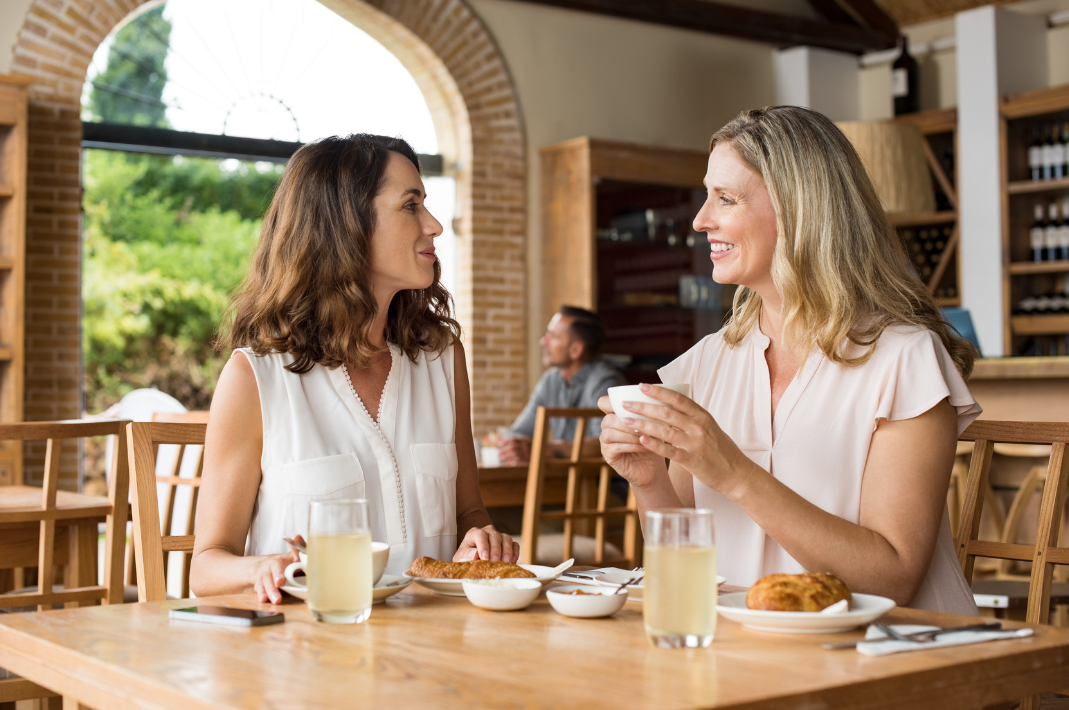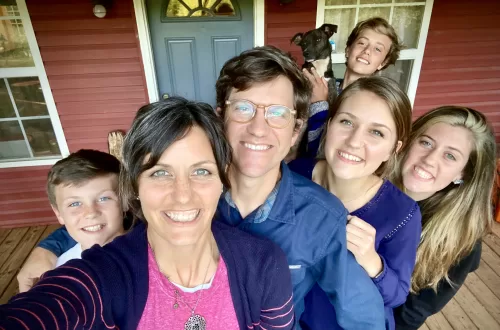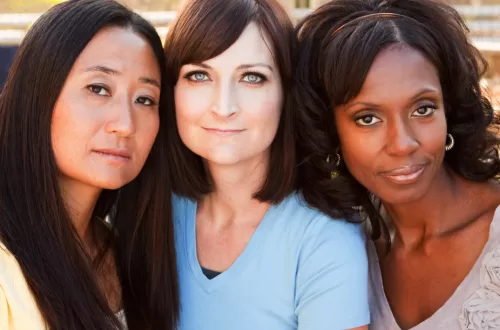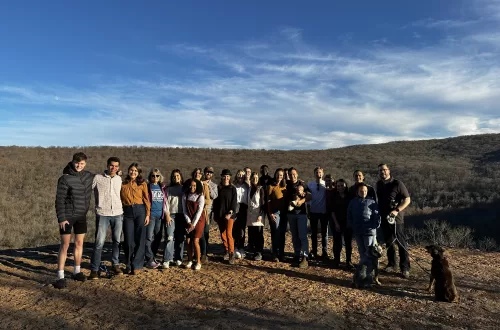I met her in the church nursery when our kids were infants. As young parents, we were regulars on the nursery rotation when she and her husband brought in their 18-month-old daughter whose temperament matched her fiery red hair. Kristie would become one of my closest friends. I’ve thought about the inception of this lifelong friendship over the last year as our daughters stood in each other’s bridal parties. The value of a non-kin relationship that spans from church nursery to wedding is not lost on me. This is a very abbreviated story of that friendship that tells why friendships like this one matter and why they are at risk today.
Why is Friendship Valuable
Friendship has been called in scientific research a behavioral vaccine for well-being. People with close friends live longer, healthier lives. They tend to have a more positive outlook and better mental health–even in the midst of adversity. They are less likely to die from a range of chronic diseases. Having a confidante to share your life and struggles with can be a powerful anti-depressant. One study “prescribed” befrienders to meet up and chat with chronically depressed women over coffee or in other outings. Seventy-two percent of the women “prescribed” a friend experienced a remission of depression within the year.
Despite its relative value, friendship is often overlooked in light of our culture’s infatuation with romantic love. Though strong marriages are built on deep friendship, marriages and the individuals in them benefit when they are situated in a strong community. In fact, our culture has put enormous pressure on the institution of marriage. In her book Marriage, a History: How Love Conquered Marriage, Stephanie Coontz highlights the unrealistic nature of our expectations of our romantic partners. Our spouses shoulder the burden of satisfying all economic, social, spiritual, and physical needs. Our social networks can ease some of that pressure. In fact, marriages situated inside of social networks are more resilient.
How to Make Friends
In many ways, the church nursery was a great setting to find new friends. It situated us in a community context with people who shared our values and were also navigating the same season of life that we were. Friendships are often built around shared experiences or shared values–though many a meaningful friendship has been built without either.
Friendships Built Around Shared Experiences
I have benefitted from many different relational orbits built around similar seasons of life. Each group of relationships has offered significant benefits in their season. I endured miserable group projects and study sessions with a cohort of college classmates who shared the same course requirements as I did. I have lamented poor reffing, high entry fees, and inconsistent hotel accommodations each summer with the parents whose sons play on the same club basketball team as my son. And of course, there are the friends I’ve made with my kid’s classmates who persist throughout the 1-13 years they go to school together.
One way that friendships benefit us is by helping us endure the stressful situations that accompany late-night study sessions, high school basketball games, and the challenges of parenting children of any age. When we talk about our lives–both the good and bad–with a supportive friend, our blood pressure is less reactive and our resting heart rate is lower. When people work on a difficult task with a friend, they experience similar cardiovascular benefits.
Friendships also help us perceive challenging circumstances less intensely. Something very concrete and definite like the steepness of a hill is perceived differently when experienced with friends. One of my favorite studies on the power of friendship revealed that people perceive hills to be less steep when they walk them with a friend than when they walk them alone or with someone less proximate.
When we share challenging experiences with others, they become lighter and more enjoyable. But many of these relationships fade when the shared experience dissipates. We still enjoy quick catch-ups when I have the rare run-in with my kids’ elementary classmates. But some connections exist because of the shared circumstances and fade when commonalities disappear.
Friendships Built Around Values
In my personal experience, the friendships built on a shared set of values have stood the test of time and penetrated my life most deeply. Meeting Kristie in the church nursery indicated that we shared a similar spiritual pursuit. That spiritual pursuit introduced a new layer of depth to our relationship. When we shared both our good and bad experiences with each other, we didn’t just share the emotional or social impact, but also discussed the spiritual implications. Knowing we shared a similar paradigm allowed me to open up about things that I might have filtered with others. I easily gave her access to concerns, disappointments, and questions that I might have otherwise held back for fear of judgment. It brought a higher level of transparency and vulnerability to our relationship-a mechanism by which friendship benefits us.
The Family You Choose
We were also both at a time in our lives when we were questioning the beliefs, norms, and practices of our family of origin. As we evaluated our parents’ practices and sorted out the norms we would reject versus those that we would adhere to, we were simultaneously integrating ourselves into a community of individuals who shared similar beliefs. The freedom to make these conscious choices might seem like an obvious right, but this voluntary association based on consciously chosen shared values is somewhat novel.
In his book The Evolution of the West, Nick Spencer credits the idea of organizing society by voluntary association based on choice and love rather than blood ties as a concept uniquely Christian. Secular scholars like Larry Siedentop highlight the important role of faith in the origins of Western Liberalism many of us in the US loosely refer to as “individualism”. Prior to the New Testament, the family dictated everything. It was Jesus, then Paul, who introduced the idea that we could individually–men, women, free, and slave–choose to follow Christ rather than the god of our family, clan, or caste.
It was in the Enlightenment that a new branch of thinking emerged that emphasized the “individual rights” over oneness and faith. In fact, the faith part was generally rejected during this period and true individualism was birthed. The importance of logic, personal rights, and liberty was emphasized over faith or collectivism.
I can appreciate why many conflate the American identity centered on freedom and rugged individualism with the Biblical principle of free will. But that fallacious conclusion produces erroneous thinking in the church and fissures in some of our most important relationships.
Biblical teachings emphasize the universal nature of access to this family of faith based on shared beliefs rather than family lineage or social status. In the Enlightenment, the emphasis shifted from oneness to self. Individual freedom and personal rights became king.
It was in the soil of these individual rights that the seeds were sown for the declining social relationships we experience today.
What’s Happening to Friendship?
By every metric, the social fabric of society is wearing down. In his book Bowling Alone published in the 90s, Robert Putnam quantified this breakdown. He defined social capital as the “social networks and the norms of reciprocity and trustworthiness that arise from them”. He went on to show its decline.
Church membership. Down.
Work-based groups. In decline.
Engagement in civic organizations. Kerploot.
Going out with friends. Not happening.
Why? Urban sprawl? Commutes? Technology? The pressure of time, money, and work? Yes, yes, and yes. All of these things are linked with the decline of social capital. But deep in the heart of all of these factors is the priority of self. Selfish ambition. Self-preservation. Self-focus.
The relational decline began to shift downward in the 20th century, the decline has gotten steeper since COVID. Before the pandemic, 3 percent of Americans said they had no close friends. That number shot up to 12 percent by 2021. The number of people who said they could count 10 people or more as close friends dropped from 33 percent in 1990 to 13 percent in 2021.
Given our focus on individual rights and self-fulfillment, we shouldn’t be surprised. Isolation is not a deviation from the norm, but the most predictable outcome of an individualistic society.
The Cost of Old Friends
The three most cited reasons for lack of friendship are low trust in others, lack of time, and introversion. To overcome these three things a person would have to overcome their fear of rejection and their own personality disposition to prioritize friendship over other competing interests. Even as I write this statement, I recognize how insurmountable this might seem. We all have preferences, a personality, and priorities.
The Knock on the Door
One afternoon, while my preschool daughters were playing on the floor, I heard a knock on the door. I wasn’t expecting anyone. When I opened the door, Kristie was standing there. “Do you have some time to talk?” she asked in a tone that indicated it wasn’t a short conversation. “Sure I said,” I put down what I was working on and opened the door.
She opened up about a creeping concern she had about some of the interactions between our families. Our girls were both a handful. She sensed that I was irritated with their daughter–and possibly even judgemental about her parenting. I was surprised and even a little bit embarrassed. I hadn’t put words around the uneasiness I felt in interactions involving our kids. But as uncomfortable as it was to admit, I had been irritated and probably had been a little judgy.
She could have just overlooked her perceptions. A lot of people would have just ignored my perceived irritation. She could have just distanced herself from our family and stopped returning calls or avoided playdate invitations. I could have gotten defensive or awkward when she brought it up. It wouldn’t be totally unusual to be dishonest with her–and even to myself–about my immature response to our daughters’ interactions.
But I owned it. In the moment it felt like I was tapping into something supernatural to not avoid or defend. She had come to me with so much authenticity, so much humility. I couldn’t help but respond in kind.
The friendship itself was so valuable, how could we not work through the issues? We lived our lives by a stated code of values, a pursuit of spiritual maturity. And what was spiritual maturity if if not pursuing one another’s best and laying down your life for each other?
And so rather than duke it out out (internally or externally) over our personal rights and preferences, we began to navigate the difficulty and the irritation we felt. “Yes, I can see how you would perceive me as irritated. I don’t really know how to respond when this happens. I don’t want to respond immaturely myself. Let’s talk about how to manage this better.”
The Cost and Benefits
This paved the way for us to walk through our kids’ adolescence. All of our kids were big personalities in a small school. They were always working toward the same awards and leadership positions at school and church. They ran in the same social circles. And they were teenagers. You better believe there were opportunities to be competitive, judgemental, or unsupportive. But that commitment–not only to each other but to a higher code–preserved our relationships and showed our daughters how to navigate those challenges.
Having strong friendships in adolescence predicts whether you will have strong friendships in your 30s. Having strong friendships at the age of 30 predicts your well-being in your 50s. I can’t help but think that having strong friendships as a young adult paved the way not only for my own wellbeing but also for that of my children. They saw friendship modeled. But our relationships also facilitated the development of their own friendships as they came along for all the outings.
I have been sick on Kristie’s couch. I have cried on her shoulder. When all of our college kids were sent home from their dorms and we had to reacclimate to houses full of older children, we walked miles around her neighborhood to talk out both the joys and the challenges. In her friendship, I have struck gold. But it certainly wasn’t without some digging and picking along the way.
New Old Friends are Hard to Find
In the TV sitcom Blue Bloods, the wise patriarch Frank Reagan reminds his family that “new old friends are hard to find”. He’s right. They are a rare gift that you can’t just go out and get. They cost something that none of us can retroactively buy: time, history, and experience. It’s wise to steward the ones you have. But to do that, we have to do the unthinkable and overcome our own insecurities and lack of trust in others. We have to give up our rights to spend our afternoons and evenings the way we want. We have to endure some sacrifice. And we have to commit to working through the inevitable offenses that arise. New old friends are hard to find. But the rewards to our physical and emotional well-being are well worth the costs.






Wonderful article! I’m so grateful to see this in my own life, and also for the reminder to keep ‘putting in the work.’
So true! It takes work but it’s worth it!
How wonderfully said! While we each have our own path, I can say my life has been shaped by the consistency, strength, and faithfulness of close, dear friends who have stood next to me in the thick and thin over years of life and process. I would not be who I am today without them, and it only gets better when we all commit to moving forward, growing, and maturing!
Thansk LynnDee!! Where would we be without our friends?
Fantastic article – highlights the rewards & work of community. Well done!
Thanks Spence!